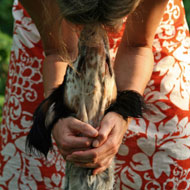
People living alone benefit most from having a canine companion
Dog owners have a lower risk of death due to heart disease, according to new research.
The study, published in Scientific Reports, assessed some 3.4 million Swedes aged 40 to 80 to show the relationship between dog ownership and heart health.
Researchers found that people living on their own benefitted most from owning a dog - a group previously reported as being at greater risk of heart disease than multi-person households.
Their results show that single dog owners had a 33 per cent reduction in risk of death and an 11 per cent reduction in risk of myocardial infection compared to non-dog owners.
Scientists say explanations could include a higher level of physical activity, increased wellbeing and social contacts, or effects of the dog on the bacterial microbiome in the owner.
“There might also be differences between owners and non-owners already before buying a dog, which could have influenced our results, such as those people choosing to get a dog tending to be more active and of better health,” said senior author Tove Fall from Uppsala University.
“Thanks to the population-based design, our results are generalisable to the Swedish population, and probably also to other European populations with similar culture regarding dog ownership.”
Swedish law dictates that its citizens carry a unique identification number. Every visit to the hospital is recorded and is accessible to researchers after de-identification of data. Since 2016, it has also been mandatory to register as a dog owner.
The study was conducted by researchers at Uppsala University, Karolinska Institutet, Stanford University and the Swedish University of Agricultural Sciences.



 The latest
The latest